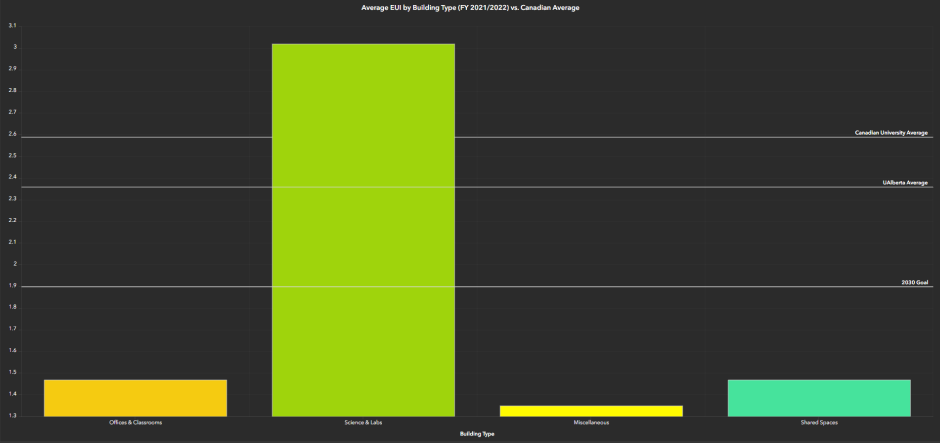Key Stats

Average Energy Use Intensity (EUI) by Building Type (FY 2021/2022) vs. Canadian Average
This chart compares the average Energy Use Intensity (EUI) of Canadian universities and the University of Alberta, along with our target goal for 2030.
Source: Energy & Climate Action
research impact
For the period 2018-2022
№ relevant publications: 1,552
№ times cited: 27,880
Source: InCites
sample Courses
- EXERM 4311 - Transmission, Distribution, and Smart City Fundamentals
- EXERM 4312 - Electricity and the Environment
- BUEC 463 - Energy and the Environment: Industry Structure, Performance and Challenges
- BUEC 663 - Natural Resources and Energy Capstone
- MEC E 443 - Energy Conversion
- MEC E 643 - Renewable Energy Engineering and Sustainability
VIDEOS
Institutional Stewardship Initiatives
District Energy System
A district energy system centrally generates and distributes heating, cooling, electricity and chilled water to the University of Alberta and associated hospitals. Operating a central thermal energy plant brings efficiencies and avoids 60,000 tons of CO2 emissions each year.
Energy Reduction Master Plan
The University of Alberta’s energy management program dates back to the 1970s. $80 million invested over the last four decades has avoided $380 million in utility costs and mitigated 2.3 million tonnes of greenhouse gas emissions. Responding to significant growth in the use and scale of the university’s facilities, the Energy Reduction Master Plan is the current strategy to keep energy bills low and minimize environmental impacts. Tactics include retrofitting buildings, encouraging behaviour changes and increasing the supply of renewable energy generated on campus.
Research institutes, centres & projects
Future Energy Systems
Future Energy Systems is a $75 million tri-agency funded research group that develops the energy technologies of the near future; examines the integration of these technologies into current infrastructure; and considers the social, economic and environmental impacts of energy innovations. Their renewable energy research includes innovations in biomass, hydrogen fuel cells, geothermal, solar, wind and smart grids.
U of A courses help students skill up for careers in renewable energy
The Faculty of Extension’s Renewable Energy Technologies Series is a trio of programs introducing professionals to the design of solar and wind power systems.

